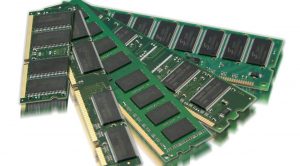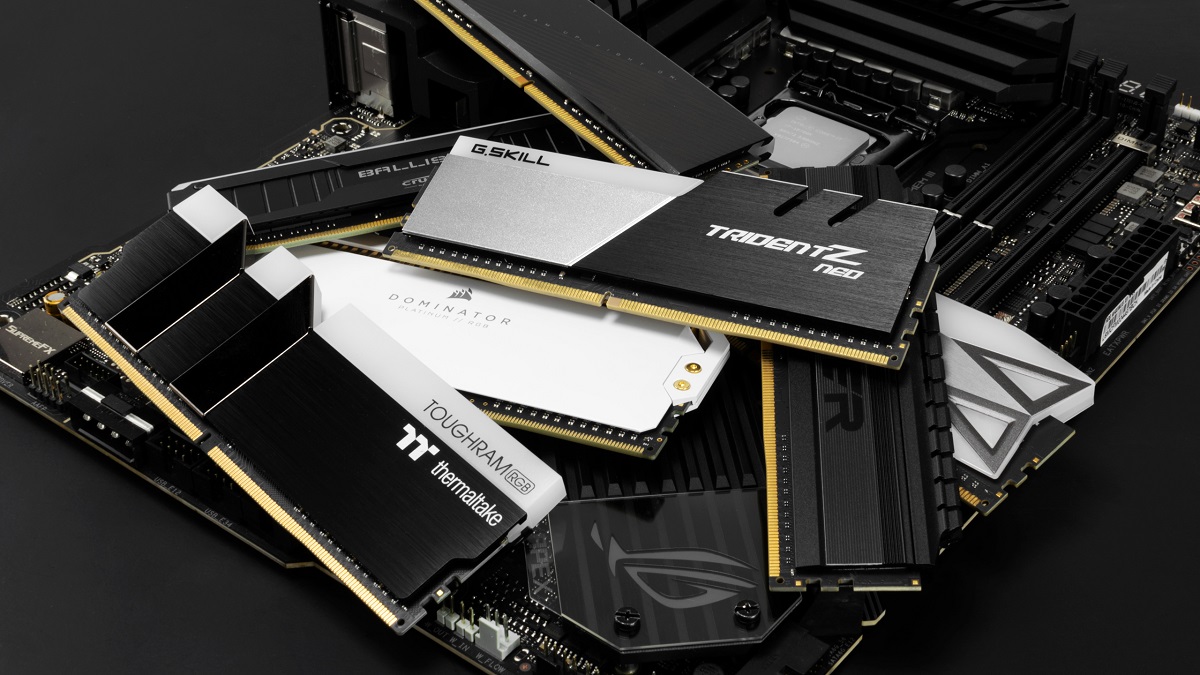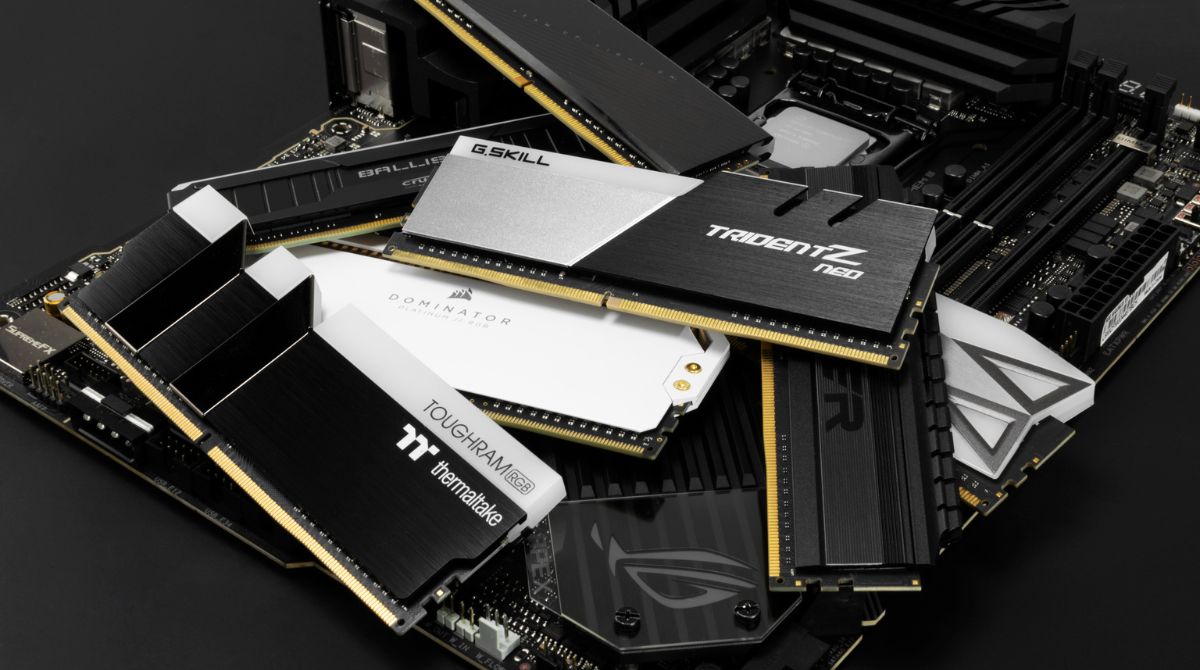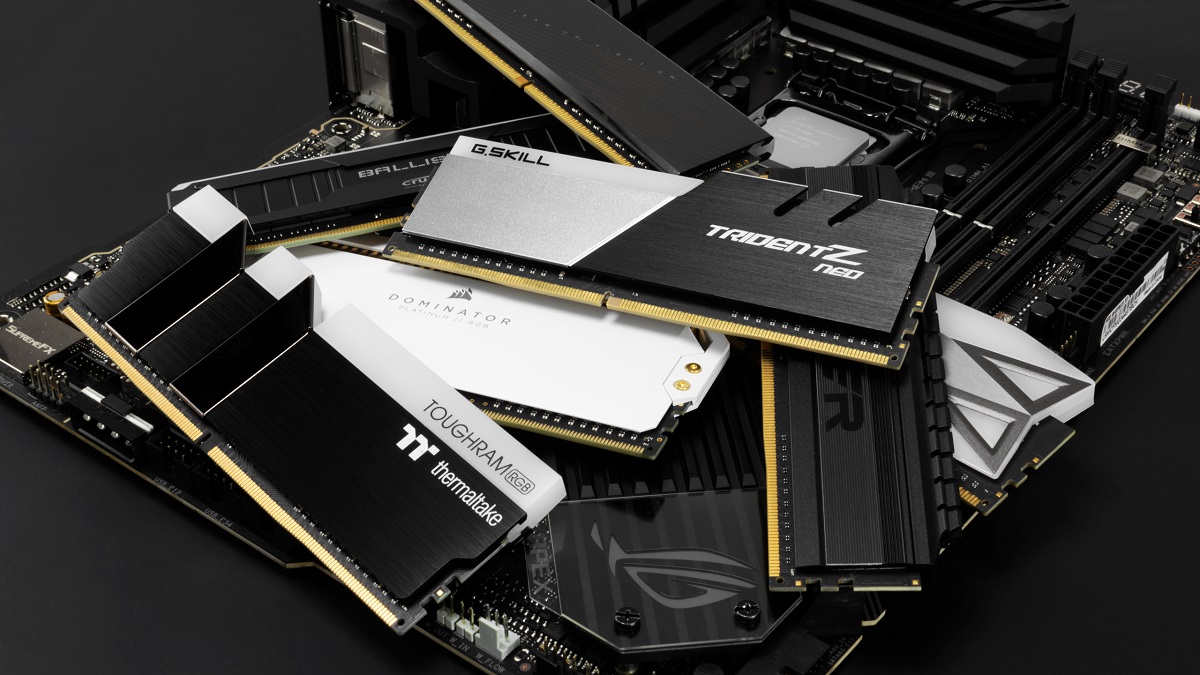Introduction
Gaming has become a popular pastime for people of all ages, and having the right hardware is essential for a smooth and enjoyable gaming experience. While many gamers focus on components such as the graphics card and processor, one often overlooked aspect is the amount of RAM, or Random Access Memory, in a gaming PC. RAM plays a crucial role in determining how well a game runs, as it directly affects the system’s ability to handle and load game assets.
RAM is the temporary storage space that a computer uses to store data that is actively being accessed by the CPU. When you launch a game, it is loaded into RAM so that it can quickly and efficiently access the necessary files and resources. The more RAM you have, the more data your system can store and access at any given time.
Having sufficient RAM is important because modern games are becoming increasingly demanding. They require more memory to store high-resolution textures, intricate AI calculations, and complex physics simulations. Inadequate RAM can lead to slower load times, frame rate drops, and even crashes during gameplay.
However, determining how much RAM you need for a gaming PC can be a bit tricky. The amount of RAM required depends on various factors, including the types of games you play, your gaming habits, and your budget. In this article, we will explore the minimum RAM requirements for modern games and discuss how much RAM different types of gamers should aim for. We will also look at the impact of RAM on gaming performance and provide some tips for optimizing RAM usage on your gaming PC.
Why does RAM matter for gaming?
RAM is a vital component for gaming because it directly affects the overall performance and smoothness of gameplay. When you launch a game, it loads various assets and data into RAM, allowing the CPU to access them quickly. Here are a few key reasons why RAM matters for gaming:
- Smoothness and responsiveness: With sufficient RAM, your gaming PC can store a large portion of the game’s data, reducing the need for constant loading from slower storage devices like hard drives. This results in smoother and more responsive gameplay, as assets can be accessed quickly.
- Multi-tasking: Many gamers like to run multiple applications simultaneously, such as streaming software, voice chat programs, or web browsers. Having more RAM allows your system to handle these tasks without impacting game performance, ensuring a seamless gaming experience.
- Future-proofing: As games continue to become more demanding and resource-intensive, having ample RAM ensures your system can handle future game releases without necessitating an upgrade.
While other components, such as the graphics card and processor, are also crucial for gaming performance, RAM works in tandem with these components to provide a well-rounded gaming experience. Insufficient RAM can lead to performance bottlenecks, limiting the capabilities of even the most powerful graphics cards and processors.
It’s important to note that RAM alone cannot make up for a weak CPU or graphics card. However, in a well-balanced system, having adequate RAM allows these components to perform at their best, minimizing potential performance limitations.
Next, let’s explore the minimum RAM requirements for modern games to get a better understanding of how much RAM you should aim for in your gaming PC.
Minimum RAM requirements for modern games
As games become more advanced and resource-intensive, the minimum RAM requirements for modern games have also increased. Game developers typically provide recommended system requirements that include the minimum RAM needed to run the game smoothly. While these requirements can vary, it is essential to meet or exceed the minimum RAM specifications to ensure optimal gameplay.
For most modern games, the minimum RAM requirement tends to be around 8GB. This amount of RAM is considered the baseline for gaming and will allow you to run most games without significant issues. However, it’s important to note that meeting the minimum requirement does not guarantee an ideal gaming experience; it simply means that the game will run on your system.
Keep in mind that the minimum RAM requirements can vary based on the type of game you play. For example, open-world games or those with intricate graphics may require more RAM to load and render large environments or high-resolution textures.
In recent years, there has been a trend towards games requiring more than 8GB of RAM. Some AAA titles now recommend or even require 16GB or more RAM for optimal performance. These games often feature detailed environments, complex AI systems, and extensive physics simulations that demand a larger amount of RAM to store and process the necessary data.
While it’s possible to run these games with 8GB of RAM, you may experience performance issues such as stuttering, longer loading times, and occasional frame rate drops. Therefore, if you’re looking to play the latest and most demanding games, it’s recommended to have at least 16GB of RAM to ensure a smoother and more enjoyable gaming experience.
Now that we’ve discussed the minimum RAM requirements, let’s explore how much RAM different types of gamers should aim for.
How much RAM do casual gamers need?
Casual gamers typically play less demanding games that do not require a significant amount of system resources. These games include popular titles like Minecraft, Stardew Valley, and older or less graphically intensive games. For casual gamers, 8GB of RAM is generally sufficient to meet their gaming needs.
With 8GB of RAM, casual gamers can run most games without encountering any major performance issues. It allows for smooth gameplay, quick loading times, and the ability to multitask without impacting game performance too severely.
However, it’s worth noting that the requirements can vary depending on the specific games a casual gamer chooses to play. If you enjoy playing more demanding games occasionally or plan to run other applications alongside your games, it may be beneficial to consider upgrading to 16GB of RAM. This will provide a bit more headroom and ensure a smoother gaming experience, especially in situations where the game may require more system resources.
Ultimately, the decision to upgrade from 8GB to 16GB of RAM for casual gamers depends on their specific needs and preferences. If budget allows and you want to future-proof your system, opting for 16GB of RAM may be a worthwhile investment.
Next, let’s explore how much RAM is recommended for competitive gamers.
How much RAM do competitive gamers need?
Competitive gamers are those who prioritize high-performance and aim for the best possible gaming experience. They often play demanding competitive multiplayer games that require quick reflexes and precision, such as first-person shooters or battle royales. To ensure smooth gameplay and minimal latency, competitive gamers should consider having at least 16GB of RAM in their gaming PCs.
With 16GB of RAM, competitive gamers can run their games smoothly while also allowing room for other applications to run simultaneously. This can be particularly useful for tasks like voice chat programs, streaming software, or video capture tools that competitive gamers often use while gaming.
Having 16GB of RAM ensures a more stable gaming experience when playing competitive online games, as it allows for faster loading times, reduced frame rate drops, and smoother gameplay. Additionally, it provides some headroom for handling unexpected background processes or operating system tasks without impacting gaming performance significantly.
While 16GB is sufficient for most competitive gaming scenarios, some competitive gamers may opt for even higher amounts of RAM, such as 32GB. This can be advantageous for those who engage in content creation alongside competitive gaming or require more system resources for streaming, video editing, or running multiple virtual machines.
Overall, the choice between 16GB and higher amounts of RAM for competitive gamers depends on their specific requirements and the extent of multitasking they engage in while gaming. Investing in more RAM can help maintain a competitive edge and ensure a smooth and responsive gaming experience.
Now that we’ve covered the RAM requirements for casual and competitive gamers, let’s move on to how much RAM content creators and streamers should consider.
How much RAM do content creators and streamers need?
Content creators and streamers have unique requirements when it comes to RAM. They engage in tasks that demand a significant amount of system resources, such as video editing, rendering, streaming, and running multiple applications simultaneously. To ensure smooth performance and efficient multitasking, content creators and streamers should aim for at least 32GB or more of RAM in their gaming PCs.
With 32GB of RAM, content creators and streamers can handle resource-intensive tasks with ease. It allows for seamless multitasking, ensuring that video editing software, streaming software, and other applications can run smoothly at the same time.
Video editing and rendering, in particular, can benefit from the increased RAM capacity. The larger the RAM, the more data can be stored in it, reducing the need for constant read and write operations to the storage device. This results in faster rendering times and smoother playback during the editing process.
Additionally, streamers often use a variety of applications while streaming, including broadcasting software, chat applications, overlays, and more. With 32GB of RAM, streamers can ensure a stable and high-quality stream while simultaneously managing the streaming software and interacting with their audience.
While 32GB is the recommended amount, some professional content creators or streamers may opt for even higher amounts of RAM, such as 64GB or more. This can be advantageous for handling extremely large projects, running resource-intensive virtual machines, or working with high-resolution footage.
Investing in a larger amount of RAM not only enhances the performance and stability of content creation and streaming tasks but also helps future-proof the system. As software and workflows continue to evolve, having ample RAM ensures that content creators and streamers can handle the demands of their work without needing to upgrade frequently.
Now that we’ve explored the RAM requirements for content creators and streamers, let’s discuss how much RAM future-proof gamers should consider.
How much RAM do future-proof gamers need?
Future-proof gamers are those who want to ensure their gaming PC can handle upcoming games and advancements in technology without the need for frequent upgrades. These gamers aim to maximize their system’s performance and longevity, and thus, they should consider having at least 16GB to 32GB of RAM.
Having 16GB to 32GB of RAM provides future-proof gamers with enough headroom to handle upcoming games and software advancements. As games continue to become more demanding, having a larger amount of RAM ensures a smoother gaming experience, especially with resource-intensive titles.
Furthermore, future-proof gamers may engage in media creation, virtual reality (VR) gaming, or running multiple virtual machines simultaneously. These activities require additional system resources, and having a higher amount of RAM can provide a more seamless and responsive experience.
It’s important to mention that the RAM requirements for future-proof gamers can also depend on their budget and specific needs. If budget allows and you want to ensure maximum performance and longevity, opting for 32GB or even higher amounts of RAM can offer a greater level of future-proofing.
By investing in a larger amount of RAM, future-proof gamers can avoid the need for immediate upgrades and accommodate upcoming advancements in gaming technology. Additionally, it provides peace of mind knowing that the gaming PC has the necessary resources to handle upcoming games and software releases.
However, it’s worth noting that future-proofing a system goes beyond just upgrading RAM. Other components, such as the graphics card, processor, and storage, also play vital roles. Ensuring a well-balanced system that meets or exceeds the recommended requirements for upcoming games is crucial for a truly future-proof gaming setup.
Now that we’ve covered the RAM requirements for future-proof gamers, let’s move on to discussing the impact of RAM on gaming performance.
The impact of RAM on gaming performance
RAM plays a crucial role in determining gaming performance and can have a significant impact on the overall gaming experience. Here are some key ways in which RAM affects gaming performance:
- Load times: Having ample RAM allows games to load and access assets quickly, resulting in shorter load times. This means less waiting and more time spent enjoying the game.
- Stability: Sufficient RAM helps stabilize game performance by allowing the system to store and access game data efficiently. This reduces the chances of crashes or freezes during gameplay.
- Frame rates: RAM influences frame rates by ensuring that the system has enough memory to store and process graphical data. Insufficient RAM can lead to frame rate drops and lower overall performance.
- Texture quality: High-resolution textures require more RAM to store and load efficiently. With inadequate RAM, the system may need to downscale textures, resulting in a loss of visual fidelity.
- Multi-tasking: More RAM allows for seamless multitasking while gaming, such as running voice chat programs, streaming software, or browsing the internet without hindering game performance.
In situations where the available RAM is limited, the system may rely on virtual memory, which uses the hard drive or SSD as temporary storage when RAM capacity is exceeded. However, virtual memory is significantly slower than physical RAM, leading to performance degradation and increased load times.
Upgrading RAM can have a positive impact on gaming performance, especially if your current RAM capacity is struggling to keep up with the demands of modern games. However, it’s crucial to ensure a balanced system by considering other components such as the graphics card, processor, and storage speed.
It’s also important to note that simply upgrading RAM will not magically improve gaming performance if other components are severely outdated or bottlenecking the system. It’s essential to assess the overall hardware configuration to maximize gaming performance.
Now that we understand the impact of RAM on gaming performance, let’s move on to discussing tips for optimizing RAM usage in a gaming PC.
Tips for optimizing RAM usage in a gaming PC
Optimizing RAM usage in a gaming PC can help maximize performance and ensure a smooth gaming experience. Here are some tips to optimize RAM usage:
- Close unnecessary background applications: Before launching a game, close any unnecessary background applications and processes. This frees up memory and reduces the strain on your RAM.
- Manage startup programs: Disable unnecessary programs from starting up with your computer. These programs consume system resources, including RAM, even when not in use.
- Use a lightweight antivirus software: Some antivirus software can be resource-intensive. Consider using a lightweight antivirus program that utilizes fewer system resources, including RAM.
- Limit browser tabs and extensions: Web browsers, especially with multiple tabs and extensions, can consume a significant amount of RAM. Close unused tabs and disable unnecessary extensions when gaming.
- Adjust in-game settings: Lowering graphics settings, such as texture quality and shadow resolution, can reduce the amount of RAM required by the game, freeing up resources for other tasks.
- Ensure RAM compatibility: When upgrading or adding RAM modules, ensure that they are compatible with your motherboard and that they have the same speed and timings to prevent compatibility issues.
- Perform regular maintenance: Keep your system clean from temporary files, cache, and unnecessary data. Regularly perform disk cleanup and use utility software to optimize system performance.
- Consider upgrading RAM capacity: If you frequently experience performance issues or play resource-intensive games, consider upgrading your RAM capacity to provide more headroom and improve overall performance.
- Keep system drivers up to date: Updated drivers can include performance optimizations and bug fixes, enhancing overall system stability and efficiency.
By implementing these optimization techniques, you can ensure that your RAM is utilized efficiently, providing the necessary resources for smooth, lag-free gaming.
Now that we’ve covered the tips for optimizing RAM usage, let’s conclude our discussion on the importance of RAM in a gaming PC.
Conclusion
RAM is a critical component in any gaming PC and has a significant impact on gaming performance. It plays a crucial role in loading game assets, ensuring smooth gameplay, and enabling efficient multitasking. The amount of RAM required depends on various factors, such as the types of games played, gaming habits, and budget.
For casual gamers, 8GB of RAM is typically sufficient to meet their gaming needs. Competitive gamers should consider having at least 16GB to ensure smooth gameplay and handle multitasking. Content creators, streamers, and future-proof gamers should aim for a higher amount of RAM, such as 32GB or more, to handle resource-intensive tasks and accommodate upcoming advancements in gaming technology.
Optimizing RAM usage is also essential for optimal gaming performance. Closing unnecessary background applications, managing startup programs, and adjusting in-game settings can help free up resources and maximize RAM utilization.
When considering upgrading RAM, it’s crucial to maintain a well-balanced system by assessing other components such as the graphics card, processor, and storage speed. These components work in conjunction with RAM to provide an immersive and seamless gaming experience.
In conclusion, RAM is a vital investment for gamers looking to elevate their gaming experience. Whether you’re a casual gamer or a content creator, having sufficient RAM ensures smooth gameplay, reduces load times, and allows for efficient multitasking. By understanding the RAM requirements for your specific gaming needs and implementing optimization techniques, you can unlock the full potential of your gaming PC and enjoy a more immersive gaming experience.
























